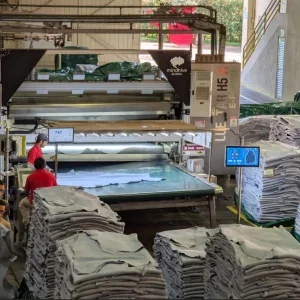
In response to growing consumer demand for greater transparency from the fashion industry, Puma has launched #KnowYourStuff, an educational content series that delves into one of today’s most debated fashion topics – leather versus vegan leather – and the environmental impact of both.
Created in collaboration with Aishwarya Sharma, one of Puma’s ‘Voices’ and Global Goals Ambassador, the company says that #KnowYourStuff translates the complexities and progressions around the use of leather and its alternatives. The seven-episode story is available to view on Puma YouTube and Sharma’s Instagram platform.
“By openly discussing the complexities of the materials used in our products, like leather and its alternatives, we hope to foster a more informed and balanced conversation about sustainable clothing and footwear choices, which is essential for driving positive change,” said Anne-Laure Descours, chief sourcing officer at Puma.
“The #KnowYourStuff series is a testament to our commitment of transparency and our promise made during our Conference of the People event to include the next generation as part of these important discussions.”
#KnowYourStuff forms part of Puma’s commitment and actions for greater transparency in sustainability, in which Sharma is one of four Voices of a Re:Generation enlisted by Puma to help translate sustainability in a way that engages the next generation.
“My goal with #KnowYourStuff is to educate and empower my audience and young people worldwide,” said Sharma. “Sustainability can be complex and the leather topic is embedded with sensitive themes, so I’ve taken care in making sure this is approached in an open and transparent way that inspires people to become informed about the materials they choose to wear.”
From visiting the Puma Archive to witnessing behind-the-scenes leather processing first-hand in Thailand, Sharma reports back on her fact-finding mission, encouraging audiences to #KnowYourStuff. Along her journey, Sharma navigates different perspectives surrounding leather with guests, including leading Puma stakeholders and PETA (People for the Ethical Treatment of Animals). Key conversations include animal welfare and the use of leather as a byproduct of the beef industry, cattle farming and concerns around deforestation, the leather tanning process, new material innovations and industry challenges.
While Puma has a long history with leather, dating back to the 1950s, today, leather accounts for only approximately 4% of its footwear materials. The company’s 10For25 targets include sourcing 100% leather from certified sources, and today the brand works with third parties, such as Leather Working Group, to ensure all leather is sourced from certified tanneries. Additionally, Puma consults animal protection organisations on a regular basis to review its animal welfare policy and actions.






